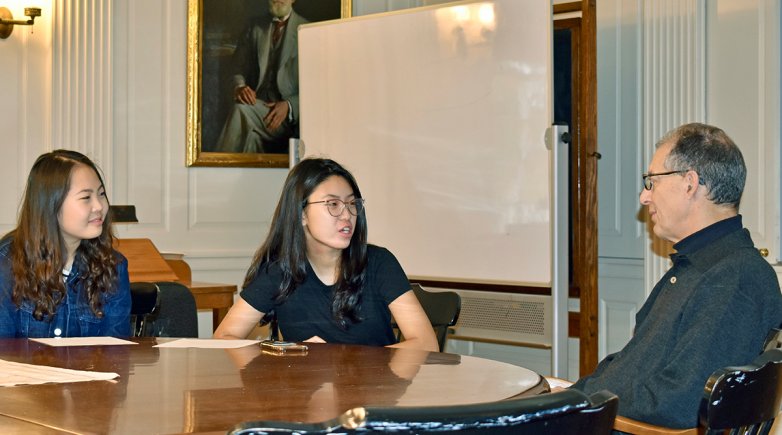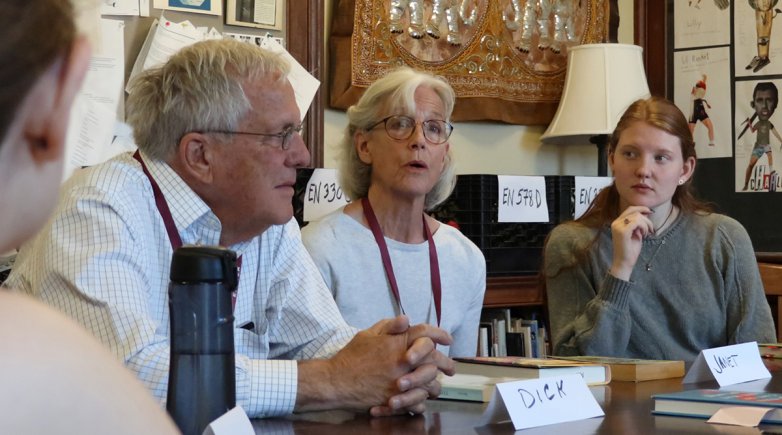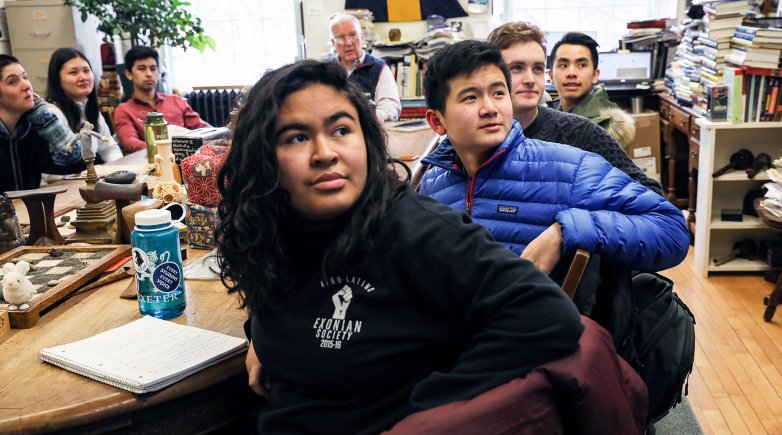6 questions for classics scholar Dr. James Romm
We asked the Bard College professor about changes in the classics community, why he loves dead languages, and what he’d ask an ancient Greek if he met one on the street.
Suan Lee and Angele Yang interview Dr. James Romm in the Latin Study.
Dr. James Romm, the James H. Ottaway Jr. Professor of Classics at Bard College, isn’t your everyday classicist. The author of four distinguished books on classical topics and the editor or co-editor of many more, Romm does not shy away from the modern. He enjoys parallels between Athens in the late 5th century and today’s political climate. And he happily observes that the classical field is undertaking research on topics long ignored.
Romm came to Exeter recently for a weeklong residency sponsored by the Classical Languages Department. During the week, he led a four-part lunchtime seminar on the topic of Greek myth and legend, delivered a public lecture titled “The Final Frontier: The Figure of Ocean in Greek Science and Science Fiction,” and attended classes.
During a break in his busy schedule, Romm sat down with Suan Lee and Angele Yang, both seniors working toward a Classical Diploma. Here are edited excerpts from their conversation.
Q: In our combined fourteen years of classical study, we've received our fair share of jabs regarding our foreign language choice. The former chair of our Classics Department, Mr. Unger, found the words “Latin is dead, Nick” written under his high school yearbook photo. That leads us to our first question: How would you respond to such claims?
James Romm: Latin may be a dead language, but it’s still very much a living tradition. The literature is as important as ever. It's the origin of so many Western traditions—it’s central to Western culture.
If a person loves language and likes to do crossword puzzles, I'd say this is one of the most interesting and complex languages, it offers the most versatility in terms of what you can do with it—word order, arrangement of syntax—and it has the most elegance of the Western languages. If a person is interested in archaeology, I'd say you're going to be turning up objects that have writing on them and you're going to need to know what it says. Someone who's going to law school and wants to understand legal arguments needs to follow a train of cause and effect, which is similar to the way Latin lays out its syntax.
Q: How has the classics community evolved over time? What direction of study do you see our generation of classicists taking in this ever-expanding field of research?
JR: You’re coming along at a great time, especially a great time for women in the field. The field has become much more gender-balanced than it used to be and in fact, in your generation, I’d say it will be perfectly balanced, or maybe even majority women. There’s a new interest in matters that weren’t much talked about in the past: gender, sexuality, homosexuality, slaves, status of women, status of foreigners. All of the marginal figures have been brought into the limelight. There are opportunities to do all kinds of new research, simply because those topics weren’t much discussed up until now.
Q: We enjoyed reading your New Yorker essays, where you offer commentary on our modern political climate through ancient Greek literary allusions. Do you think classical tales easily resonate with a modern audience?
JR: Yes, they absolutely do. I think the pieces you're referring to were about Shakespearean drama and Aristophanic comedy.
The Aristophanes production [see Romm’s review of an updated version of “Knights"] was designed as a commentary on the Republican race for the nomination in 2016, adapting Aristophanes’ “The Knights” to the field of Republican candidates, casting Trump and Hillary Clinton as the antagonists in that play. Aristophanes is the perfect author for making that kind of leap because he's talking about contemporary politics in democratic Athens in the late 5th century, when things were basically falling apart politically.
All of Athenian literature from that time, the product of a troubled democracy, is highly relevant to our moment today. You read Thucydides, for example, the history of Athens’ failure in the war against Sparta, and how things came unglued after the death of Pericles. That's a study in the problems of a leaderless democracy, which is what we inhabit today. Thucydides was quite aware that his texts would be taken as a lesson by subsequent ages. He called it a possession for all time and said that human nature basically stays the same, that these things he’s reporting would happen again. So here we are.
Q: If you could meet an ancient Greek or ancient Roman, what would be the first thing you’d ask?
JR: The fact is, we do meet those people in our readings. Take Herodotus for example, who I’ve been talking about in the seminars. He’s a very oral writer. He talks as if he’s talking right to you, as if he’s sitting down with you. He has a very intimate voice, and sometimes he addresses the reader directly as second person singular. It’s as if he wants to tell you stories. He also wants to tell you what he’s thinking about in a very personal way. So to me, it’s as if we had bumped into him on the street. His mind, his view of the world is so vivid that it’s like meeting him in person.
Q: How did you find your niche in classical study?
JR: I started off being interested only in literature: epic and tragedy, their Renaissance descendants and modern-day descendants. But over time, I've gravitated more towards history. As I’ve aged and gathered more of my own history behind me, I’ve found the study of history more gratifying. My research now is very focused on who historical personalities really were—what they achieved or failed to achieve, and what their successes and failures teach us about politics in the present day.
Q: What words of advice would you impart to budding classicists?
JR: Study hard. That doesn’t seem to be advice that’s needed here at Exeter, but the ancient languages are a lot of work and a lot of memorization. They require more concentration, perhaps, than a modern language or other fields of study. But throw yourself in.
Editor's note: Dr. Romm’s visit was supported by the Behr Fund.
Suan Lee is from Wellesley Hills, Massachusetts, and serves as editor-in-chief of The Exonian.
Angele Yang is from Saratoga, California, and is a news editor at The Exonian.


